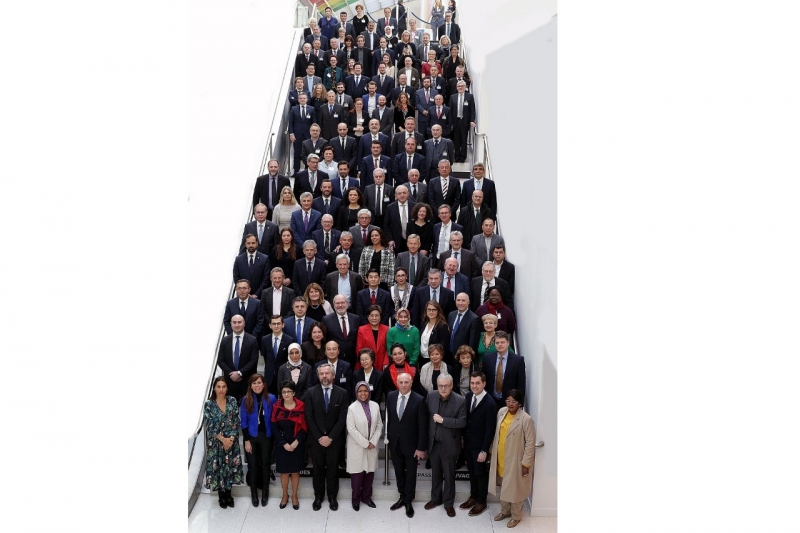On day three of the joint meeting, Parliamentary Group on Tax held a meeting, where MPs and parliamentary officials took part, while the introductory part moderated by Mr Pascal Saint-Amans, OECD Director of the Centre for Tax Policy and Administration, was devoted to the topic: “G20 standards: Base Erosion and Profit Shifting (BEPS) & Automatic Exchange of Information (AEOI) – How far have we come?”. During this part of the meeting, it was noted that automatic exchange of information, as a key pillar, ensured the integrity of the global financial system, making all the necessary information available to the tax authorities, for the purpose of implementing the established policy in this area. On this occasion, the OECD's work on this issue through the activities of the Global Forum on Transparency and Information Exchange for Tax Purposes was particularly discussed, which ensures the effective implementation of information exchange upon request as well as automatic sharing of financial accounts data as important elements of the process. During the discussion, Parliamentary Group on Tax provided insight into the standards in the subject area, the process of the current reviews and the results achieved in this regard, with a special emphasis on the importance of the effectiveness of digital data exchange and the whole processes and social benefits in this connection.
On this occasion, on behalf of the OECD Centre for Tax Policy and Administration, the participants of the joint meeting were addressed by Ms Sophie Chatel, OECD Head of the Tax Treaties Unit at the Centre for Tax Policy and Administration, Mr Maikel Evers, councillors for tax treaties, and Mr Achim Pross, Head of OECD International Cooperation and Tax Administration Division at the Centre for Tax Policy and Administration. During the discussion that followed, they discussed the “Base Erosion and Profit Shifting (BEPS) Implementation”, representing ikey actions, notably exchange of information as well as the elimination of harmful tax practices and mutual agreement procedures to ensure that tax treaties are applied in accordance with their intents and purposes. In this regard, the Inclusive Framework on BEPS was presented to the participants, with 100 countries and jurisdictions being its members. It oversees the application of BEPS's action items on the exchange of tax solutions and drafts reports in this regard. This was followed by presentations on the topic: “Tax Transparency”, when Mr Radhanath Housden, Head of the Automatic Exchange of Information Unit at the Centre for Tax, addressed the participants of the NATO PA and OECD joint meeting, as well as Mr Andrew Auerbach, Andrew Auerbach, Counsellor in the said Centre. During the discussion on the said topic, the issue of applying international tax regulations was highlighted, bearing in mind the highly digitized nature of the global economy, with particular reference to the work of the OECD Working Group formed in this regard, and proposals to address this key issue in taxation policy.
In the afternoon part of the NATO PA and OECD joint meeting, bilateral meetings were held with OECD experts and OECD member country delegations on the topic “Health”.
The joint annual meeting of NATO PA and OECD ends today.
Members of the Standing Delegation of the Parliament of Montenegro to the NATO Parliamentary Assembly Mr Obrad Mišo Stanišić and Mr Genci Nimanbegu took part in the joint meeting of the Economics and Security Committee and the Organisation for Economic Co-operation and Development (OECD).
* * *
The Organisation for European Economic Co-operation (OEEC) came into being on 16 April 1948. By making individual governments recognise the interdependence of their economies, it paved the way for a new era of cooperation that was to change the face of Europe. Encouraged by its success and the prospect of carrying its work forward on a global stage, Canada and the US joined OEEC members in signing the new OECD Convention on 14 December 1960, and its entry into force officially born the Organisation for Economic Co-operation and Development (OECD).
Today, 35 OECD member countries worldwide regularly turn to one another to identify problems, discuss and analyse them, and promote policies to solve them.
It provides a forum where governments can work together to share opinions, work together, share experience and knowledge and seek solutions to common problems, placing thereby a special focus on comprehensive analysis of information to predict future economic trends.
Drawing on facts and real-life experience, we recommend policies designed to improve the quality of people's lives. We work with business, through the Business and Industry Advisory Committee to the OECD (BIAC), and with labour, through the Trade Union Advisory Committee (TUAC). It has active contacts as well with other civil society organisations, sharing with them commitment to market economies backed by democratic institutions and focused on the wellbeing of all citizens.
Today, OECD 35 member countries span the globe, from North and South America to Europe and Asia-Pacific. They include many of the world's most advanced countries but also emerging countries like Mexico, Chile and Turkey.











